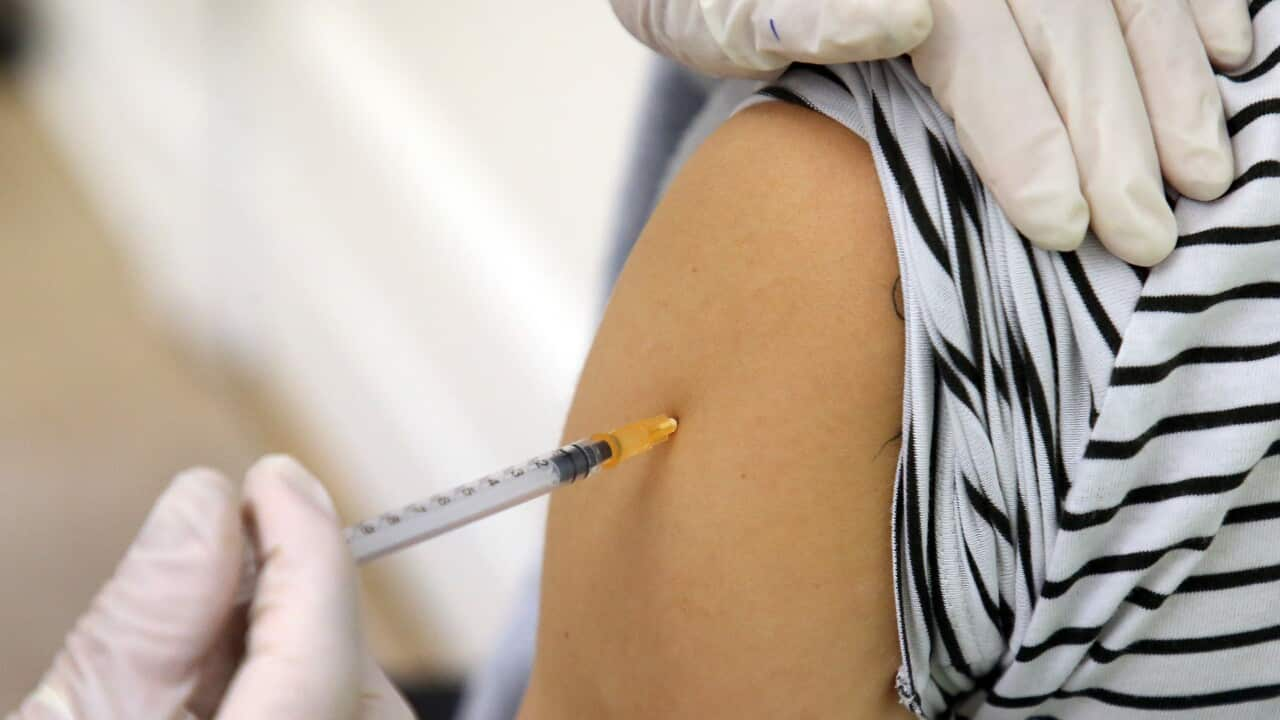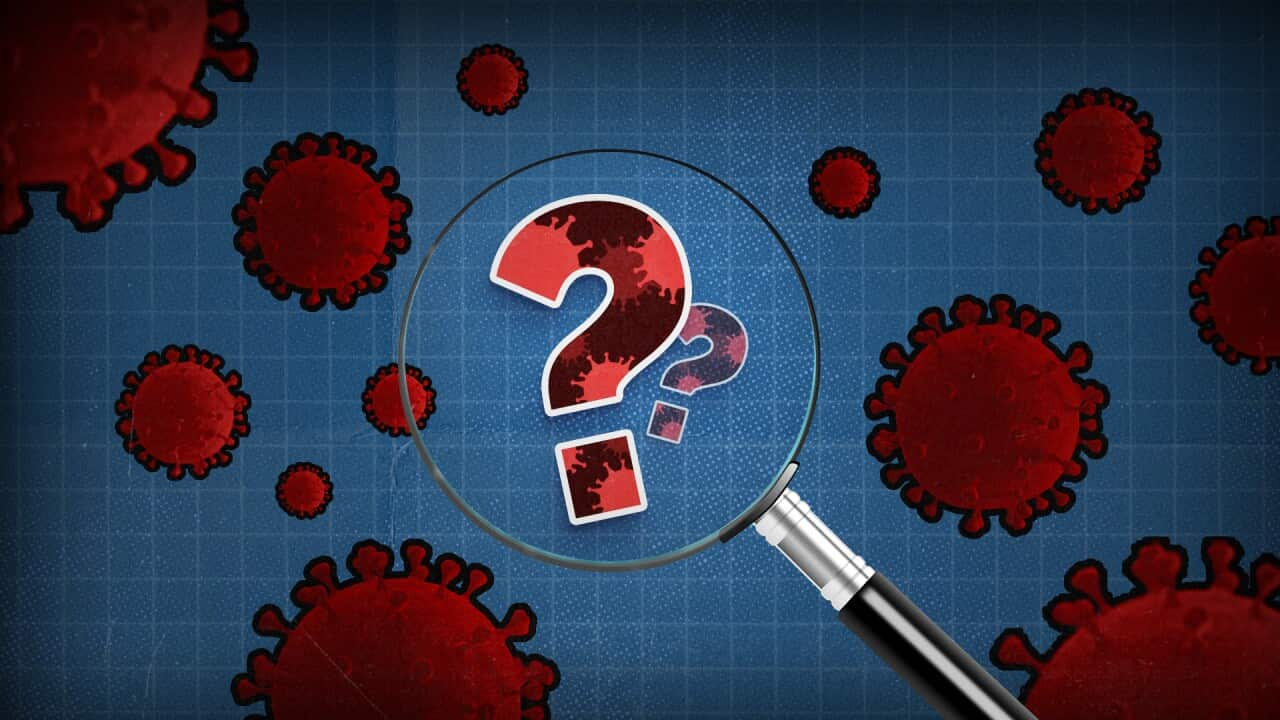The new monovalent COVID-19 vaccines from Pfizer and Moderna have started to be approved for use in other nations.
In the US, the Centers for Disease Control and Prevention recommended on Tuesday everyone aged six months and older receive an updated shot.
The Therapeutic Goods Administration (TGA) said it had started evaluating applications from Pfizer and Moderna for use of the new monovalent vaccines in Australia.
"As with all COVID-19 vaccines to date, all COVID-19 applications will be treated with the highest priority, however, the TGA will only be in a position to make a registration decision once all the required data has been provided and assessed," a TGA spokesperson told SBS News in a statement.
What are the benefits of the updated vaccines?
The reformulated COVID vaccines from Pfizer and Moderna target the XBB.1.5 subvariant of Omicron, .
Professor Adrian Esterman, chair of biostatistics and epidemiology at the University of South Australia, said that meant they would be "much more effective" against newer strains of the virus than older vaccines.
"Most of the subvariants circulating in Australia at the moment are of the XBB variety, and therefore the new updated booster should provide really good protection against all of these XBB, recombinant subvariants," he told SBS News.
"I don't think there's as much evidence that we need to give it to people who aren't at higher risk, or younger people."
There were reasons why younger people might consider getting one of the new shots, though, Esterman said.
"Many people in their 40s, late 30s have got very elderly grandparents, who are also at high risk, and therefore by getting vaccinated themselves, they have less risk of transmitting it to them," adding it also reduced their chance of developing long COVID.
Professor Catherine Bennett, chair in epidemiology at Victoria's Deakin University, agreed it was a factor worth considering for those who weren't up-to-date with their boosters.
"The likelihood and the severity and duration of long COVID, per infection, has reduced over time," she said.
"That's a combination of building immunity, but particularly of vaccination programs and Omicron being slightly less likely to trigger that long COVID response — so it shouldn't be out of people's thinking."
What's the current booster advice in Australia?
The Australian Technical Advisory Group on Immunisation (ATAGI) recommends that everyone aged 75 and over receives an additional 2023 booster if six months have passed since their last vaccine dose.
For those aged 65 to 74, or adults 64 and under with severely compromised immune systems, ATAGI's advice is to consider getting another 2023 booster if six months have passed since your last dose, after discussing it with your healthcare provider
It encourages those who were recommended to have a booster in February this year but haven't yet to do so as soon as possible.
How much COVID is there in Australia right now?
While low rates of testing mean it's hard to determine just how much COVID-19 is circulating in Australia right now, hospitalisation figures seem to indicate "we're in a bit of a trough", Esterman said.
But that could soon change now a case of the "very infectious" Pirola variant has been recorded in Western Australia.
"Because it's so different to the other Omicron subvariants, I think there is a reasonable chance it could cause a new wave, and fairly quickly," he said.
"The good news is that it doesn't appear to be much different to other Omicron subvariants in terms of the severity – at least as far as we know, because there's not been so many cases that we could really do a proper analysis.
"The other good news is that it appears as though the new updated booster shots from both Moderna and from Pfizer do appear to be reasonably effective against it."
Bennett said if Australia did experience a new wave, it would likely be caused by a combination of subvariants, not just Pirola.
"We might start to see case numbers push up again, as we get into October," she said.
"I think that will coincide with decisions from ATAGI about advice, particularly for the people more vulnerable, who have lost a greater degree of protection from prior vaccination, and the people who are less likely to have had that natural exposure to boost immunity."
Should you wait until the new vaccines are approved to get a booster?
Esterman said if you are due to get another booster and travelling overseas soon, he would recommend getting one of the vaccines currently approved for use in Australia before you leave.
For those who don't have international travel plans or who are considered to be at low risk of developing severe disease or dying from COVID-19, he said they should be able to wait until the TGA reached a decision on the new monovalent vaccines.
Bennett agreed that people eligible for another shot who were considered low risk could "afford to wait a little while" to get their booster, even if it's been six months since their last COVID-19 infection.
"Boosters will come into good effect in two weeks," she said.
"Because (the new monovalent vaccines) are already under evaluation in Australia, we might have news on that in the relatively near future."
"But if our infection rates are starting to rise, and people would prefer to avoid an infection or avoid the risk of having a symptomatic infection or a more severe infection, then (getting a booster as soon as possible) is certainly something to look at."













